Meet the Team: Frontend Developer Tony Barker
Tony Barker is a frontend developer specialising in user interfaces and theming. He’s been working with Drupal since 2009, and draws on his background of music and maths to create incredible digital experiences.
Alison Visser: What do you do at Annertech?
Tony Barker: I work on the Managed Services team. We manage infrastructure and maintenance and are the first line of response for our clients’ websites. We also respond to small feature requests and changes.
We have lovely clients, who are sometimes wearing many hats so we support them to focus on the work that they do. It's rewarding to be able to find solutions to help our clients achieve their goals.
In terms of the skills that I bring to the team, I’m a frontend specialist, concerned with user interfaces and theming, as well as having a great all round knowledge of Drupal and knowledge of the web in general.
Alison: How long have you been on the development side of things?
Tony: I first started coding when I was a youngster, writing programmes in Basic on my Acorn Electron and then I built HTML websites on the early internet in the 90s. I became a professional developer around 2009.
Alison: How did you learn how to code?
Tony: I suppose there are three threads to that journey. The first aspect is general problem solving and logic. That started with an interest in maths – there’s a big mathematical element to coding and I studied some coding modules, primarily Java, at university. I would read books to figure something out. Even when we have every answer at our fingertips these days, I still love a paper book. Figuring out how to solve problems is integral to coding.
Another great way to learn to code is by learning from other people, particularly at Drupal meetups, camps and sprints, and by learning from other developers as you're working on projects. Of course, that works both ways and it’s so fulfilling to share your knowledge with others too. You never stop learning because the internet is always changing and the software is always changing.
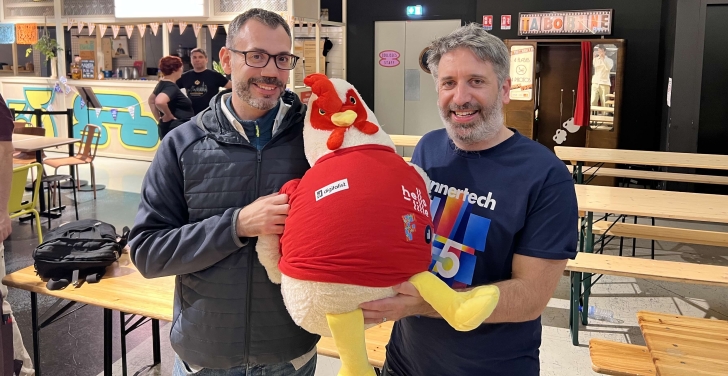
DrupalCon is one of the biggest events on the Drupal calendar, and it's an opportunity for like-minded people to get together and chat about all things Drupal. While out and about during DrupalCon Lille, Tony (right) and backend developer Adrien Sirjacques ran into the conference mascot, Lil’ Rooster.
Finally, there is the production aspect. I was an amateur musician and spent a lot of time in recording studios, and the principles of audio production apply to any production, like website production. With audio production one of the main principles is that you need to get a good recording into the mic. If what goes in isn't good quality it’s hard to fix later in post-production.
Alison: How did you get involved with Drupal?
Tony: I started building websites and creating graphics to promote gigs. While I was researching software I evaluated Drupal, and found its architecture was really powerful for relating content to other content. Around the same time I started working at a business that was using Drupal for its clients’ website projects. I was the Operations Manager but I became involved in all aspects of the business, including website production and I even did a little audio production there, editing audio for video, too.
Alison: Can you tell us a little bit about yourself?
Tony: My wonderful wife Sophie and I had our dream wedding in September in Otterburn in Northumberland. We had some Annertechies there. And we all had a great party.
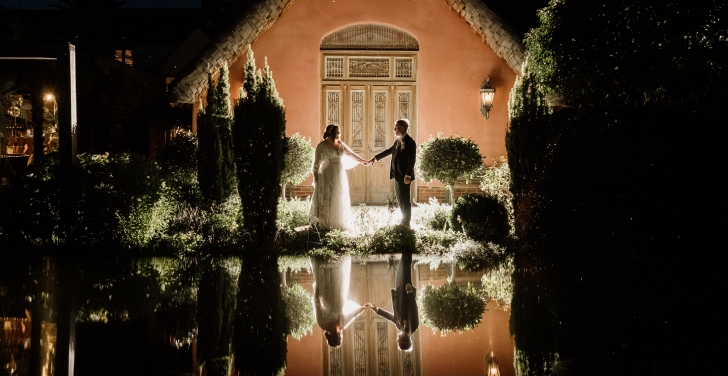
Tony and his wife Sophie at their wedding in September 2023. Photo: Eye Of The Tyne
We live on the Northumberland coast between Newcastle and Edinburgh. There is so much history here. There are loads of castles, Hadrian’s Wall and lots of conservation as well. The area is also known for its protection of important nesting birds that come close to us this time of year. We have Arctic terns, little terns and ringed plovers at Long Nanny. This area is also famous for puffins.
One of the things I love to do is get out and about and go exploring rock pools and say hello to the hermit crabs.
We have some of the best dark skies in England. It’s incredible for stargazing and over the last few years I have gotten into the stars and galaxies. The aurora earlier this year was incredible.
I enjoy photographing the sky, but it is a very amateur endeavour at the moment. I’d like to get some equipment, but professional equipment is expensive so I have thought about having a go at using a Raspberry Pi to control a telescope to pan the sky.
One of my favourite places at the moment is the Kielder Observatory. They host stargazing nights there with experts who will teach you about loads of different aspects of astronomy. They have an amazing observatory, with a big powerful telescope.

Tony took this photo of the Northern Lights in May 2024.
Alison: You live in a beautiful part of the world. Has this always been home?
Tony: I grew up in Ipswich, a small town in Suffolk, made famous in the past by the great Ipswich Town football sides of the early 60s, 70s and early 80s. Ed Sheeran is a fellow tractor boy, who has his logo emblazoned on the front of the shirts as club sponsor.
Ipswich Town are going really well at the moment. They have just been promoted back to the Premier League after back-to-back promotions. It's been wonderful to follow over the last few years. We are dreaming at the moment that the brilliant manager we have in Kieron McKenna might emulate the great managers we have had in the past – Sir Alf Ramsey and Sir Bobby Robson, both legends of the game.
It was inspiring to grow up close to the stadium, where we could hear the crowd roaring every time there was a goal.
Alison: Do you play?
Tony: Not these days, but I do play golf! It is such a challenging game that it helps me to stay focused on difficult technical challenges and composed under pressure. It's good to be among all that greenery and it is a wonderful feeling when shots come off. However difficult coding can be, it has nothing on trying to strike a golf ball!
Alison: You’ve mentioned music and recording studios. Sounds like you were quite serious about music?
Tony: I lived in London when I was in my 20s and played in a band. We got a good following in London and we did some tours. We did take it seriously but we had some unbelievable times. I met a lot of great friends and learnt a lot from music.
I’m a music fan first and foremost. Even now, if I'm having a bad day then listening to music will put me into a good mood straight away and playing is definitely therapeutic.
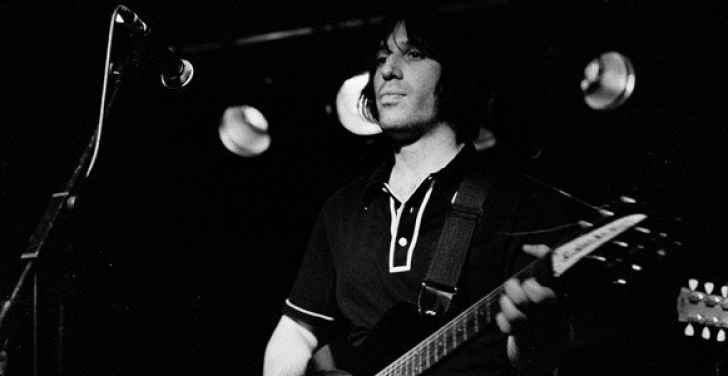
Tony during his gigging days.
Alison: Any particular kind of music?
Tony: A really wide variety of music. Particularly indie and soul music. And good pop. If I had to name my favourites I’d say Kevin Rowland (of Dexys) and Primal Scream. I go to see a lot of bands as well.
At the moment I love The Last Dinner Party. And I discovered some great bands during the Covid pandemic – like Black Honey. I prefer watching bands at the smaller venues but I’ll go watch a big act at a stadium or festival too.
Benicàssim in Spain have a great festival, where I was lucky enough to see Lou Reed and Brian Wilson in the past. I’ve seen Beyonce, Arctic Monkeys, Ed Sheeran and the Foo Fighters Taylor Hawkins tribute at Wembley in the last few years... During Covid we couldn’t go out and do anything like that so in 2021/2022 the first thing we went to was the Victorious Festival in 2021 and it was a big outpouring of love, soaking up live music and enjoying being around people. So we did go pretty crazy with our gig going for the next couple of years!
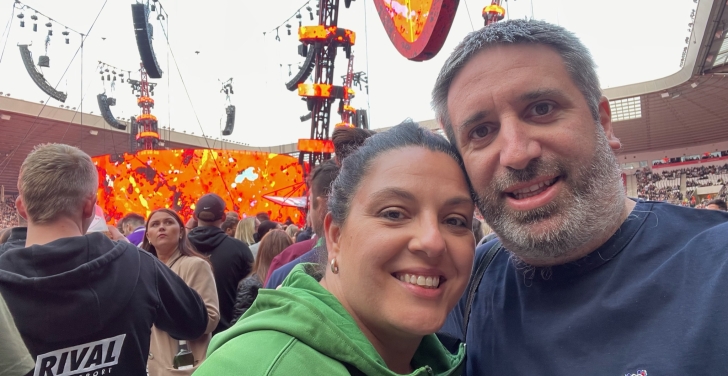
Tony and Sophie at one of the Ed Sheeran concerts at Sunderland's Stadium of Light.
Alison: Are there any similarities between a career in music and development?
Tony: One of the things with doing music is that you travel many hours to another city so even if there is a technical problem you are still going to go on stage. It breeds tenacity, which stands you in good stead for solving difficult problems.
There is a performance aspect to building websites. Ultimately you are creating something for an audience, so there is that parallel too. People can feel whether a web page is balanced or unbalanced, even if they can’t say why, just as you can sense an instrument is out of tune.
I saw some fascinating Disney guides for drawing Mickey Mouse. The instructions included that Mickey’s ears must never be perfect circles and that overlapping lines were okay. The same principles apply to having a human eye for spacing elements on a web page, which helps the page to have soul, help to relate to the story being told and to relate to the people telling it.
Sometimes all of that needs to be precise. When to be precise and when to leave some space is something that AI, which is on everybody’s lips at the moment, is going to have a really tough job figuring out.
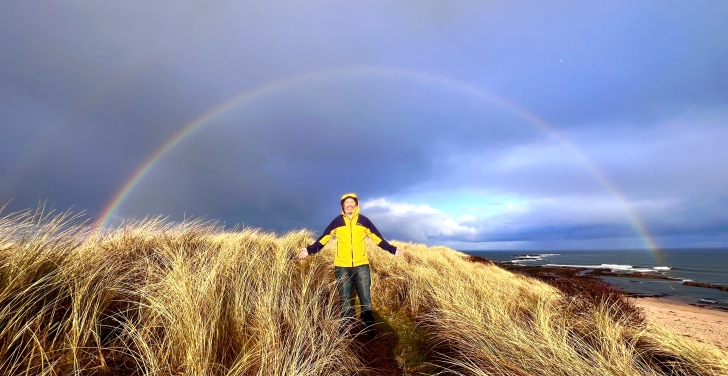
Tony spots a rainbow during a walk along the Northumberland coastline.
Alison: Do you find you use much of your maths studies in this job, or is it better to follow your gut?
Tony: As well as using geometry and algebra, it’s very useful to use analysis tools and statistics to make decisions. You can use your experience and go with your gut and make an educated guess about what the best thing is to do.
When we’re doing performance work to improve or enhance a website a lot of our decision-making is based on evidence, but it can be quite resource intensive to do that. You don’t always have that option.
But if you have the luxury of measuring things, it is really valuable. It’s so often that we find something unexpected in the evidence and that happens because ultimately each case is unique.
Alison: How does the Annertech team approach the more challenging cases?
Tony: I think one of the important things we do in Managed Services is to look in depth into requests to help shape it to something that is going to work really well for users in the browser first and foremost, that it will achieve the organisation’s goal and that it will fit well with the existing design system and system architecture.
With a solution mapped out, sometimes I’m enlisting the help of one of our incredible back end developers to take care of the logic and sometimes they will ask me to create the user interface or add some polish to the presentation. We have some fascinating technical discussions.
Once we have decided on an approach and our client likes the approach too, everyone is behind it and dedicated to achieving it, so we can see before we start coding that there will be a great outcome. The team dynamic at Annertech is something special.
Then there are the personal friendships I’ve made, and my own growth through the Drupal community and the developers I’ve worked with, in particular at Annertech.
The environment in general has been thoughtful and nurturing, and it has helped me. If I worked in another environment I don’t think I would have achieved such personal and professional growth. That motivates me each day.
Do you need a team that finds the best solution?
At Annertech we shape our solutions to something that will work really well for users, your organisation and the new website. Our team adapts to your changing needs.
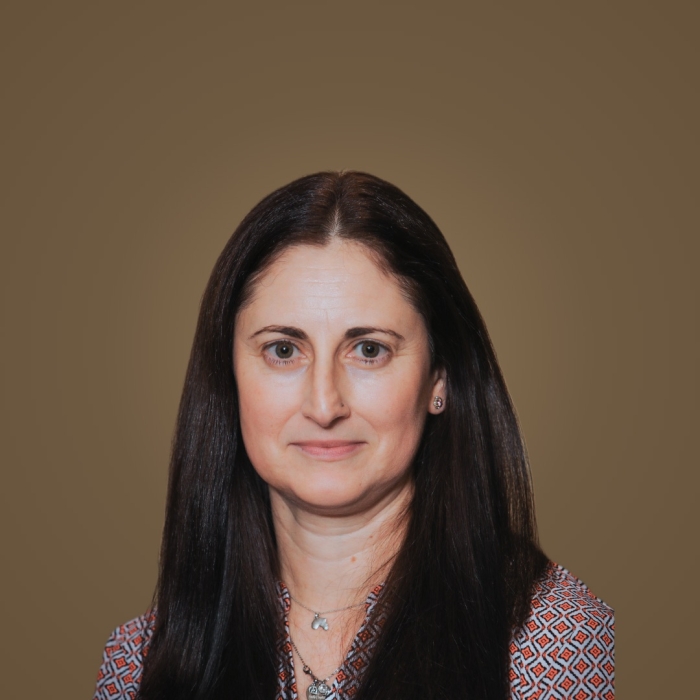
Alison Visser Head of Content
After more than two decades in journalism, Alison now collaborates with Annertech's clients to ensure that their content is the best it possibly can be.

